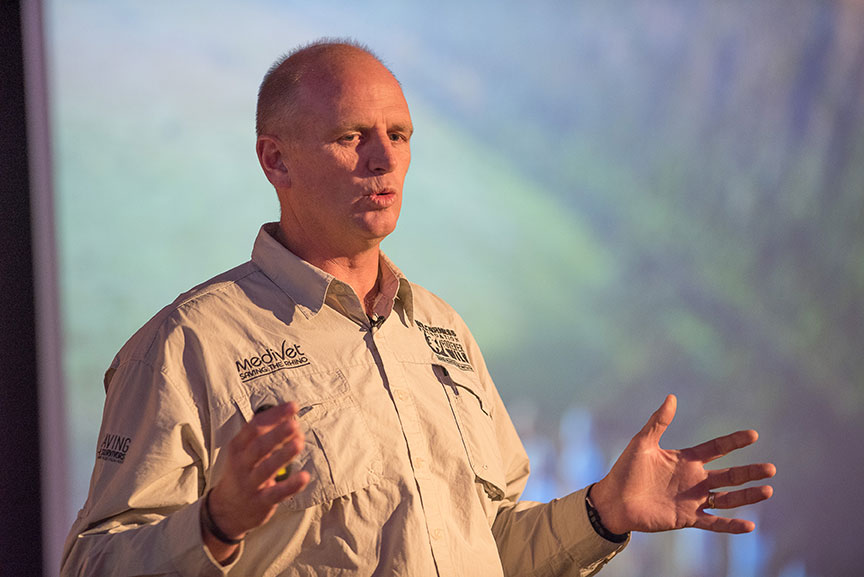January 28, 2016
Saving the Rhinos is a Global Responsibility
At a public lecture, wildlife veterinarian Will Fowlds said his partnership with TCU is “bubbling over to action on the ground that’s making an impact.”

Dr. Will Fowlds leads rhino conservation efforts from his Amakhala game reserve in South Africa. (photo by Glen E. Ellman)
January 28, 2016
Saving the Rhinos is a Global Responsibility
At a public lecture, wildlife veterinarian Will Fowlds said his partnership with TCU is “bubbling over to action on the ground that’s making an impact.”
Rhino horn, by weight, is the most expensive commodity in the world, wildlife veterinarian Will Fowlds said at a packed public lecture on Wednesday night. Without a global effort to cut demand and protect the fewer than 20,000 remaining rhinos, the species will face extinction in the very near future.
Fowlds urged a rapt and at times emotional crowd of around 300 people to take ownership of the crisis. “Educate yourself,” he said. “Then like and share until your fingers bleed.”
Rhinos are not just zoo curiosities, Fowlds said. They are “iconic” sentient beings representing the tenuous link between the 21st century and our prehistoric past.
The wildlife veterinarian first came to TCU in 2014 to receive the Global Innovator’s Award, an honor and associated cash prize Discovering Global Citizenship bestows biannually. The award’s intention is to cultivate ongoing partnerships between TCU students, faculty and change makers doing vital work across the planet.
Mike Slattery, director of TCU’s Institute of Environmental Studies, nominated Fowlds and has since taken a group of 15 students to Amakhala, the South African game reserve where the veterinarian works, lives and occasionally performs surgeries on rhinos that have been poached for their horns.
The TCU professor’s students are waging awareness campaigns and generating ideas about how to address what Fowlds called “an incredibly complicated crisis.” Students organized fundraisers, including the upcoming “rhino run,” a 5K at Amon G. Carter Stadium on March 20.
The biggest conservation challenge is reducing demand in places where people purchase rhino horn, mainly Vietnam and China. “In Vietnam, it’s considered a cure for cancer and a sign of wealth and power,” said Tu Huynh, president of the Vietnamese Student Association at TCU.
The student association sponsored the lecture and is working to spread the message in Vietnam that rhino horn is no more than keratin, which is the same substance in human fingernails, and consuming the animal’s horn will not cure disease. The group also plans to translate the student-generated videos into Vietnamese.
Animal lover Kelsey Patterson, wife of football coach Gary Patterson, also spoke at the Wednesday night event, and reiterated the urgency of ensuring the survival of the rhino species. “It’s not just about a beautiful animal,” she said. “It’s about the planet.”
Look for more on the TCU Rhino Initiative and Discovering Global Citizenship in TCU Magazine’s Spring 2016 issue.

Your comments are welcome
Comments
Related reading:
Features
Living Off the Land
TCU’s Institute of Ranch Management sends graduates abroad to improve the world’s agricultural practices.
Campus News: Alma Matters
Man with a planet
Business and science must join forces to solve the world’s needs, says guest researcher and Egyptian chemist Hassan Azzazy.